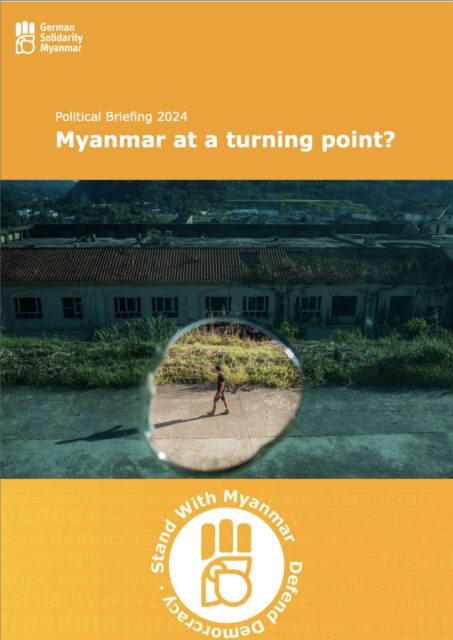Political Briefing 2024: Myanmar at a Turning Point?


On 3rd May 2024, German Solidarity Myanmar published a political briefing paper for the second time. Titled “Myanmar at a turning point?”, the briefing paper analyses the current situation in Myanmar, the latest developments in 2023/2024 and presents policy implications for Germany and the European Union. The briefing paper has been shared with policymakers in the German Government as well as representatives of civil society and media
Executive Summary
At a time when the headlines are dominated by the war in Ukraine and the conflict in the Middle East, Myanmar remains one of the world’s forgotten conflicts. The country is the scene of the worst humanitarian crisis in the strategically important Indo-Pacific region. It is no coincidence that it is ranked 5th on the International Rescue Committee’s 2024 Emergency Watchlist . On the Economist Intelligence Unit’s Democracy Index, the country ranks second to last below North Korea. Myanmar – long a blind spot in European engagement in the region – is also at the centre of geopolitical trends and global challenges. After nine years of democratic opening between 2012 and 2021, Myanmar now exemplifies the rise of authoritarian regimes and the global crisis of democracy. The country is a hotspot for trends ranging from climate change and biodiversity loss to religious extremism, from refugee movements to international drug trafficking. So the international community ignores Myanmar at its own peril.
At the same time, there has been reason for optimism in Myanmar since 2023. The Myanmar democracy movement has come a long way since the coup in February 2021, evolving from a spontaneous movement of mass civilian protests into a revolutionary resistance movement. For the first time in Myanmar’s history, there is a broad alliance of ethnic groups against the regime. The People’s Defence Forces (PDF) are on the advance in many areas of Myanmar. Recently resistance groups were able to achieve significant victories against the military with Operation 1027. The last six months in particular have been a turning point in the Myanmar people’s “Spring Revolution” against military rule.
In contrast to the conflicts in Syria, Yemen and Sudan, Myanmar’s resistance movement is not fighting a proxy war, but is on its own. And contrary to the predictions of foreign Myanmar experts that the uprising against the coup would be quickly crushed without direct support from the international community, the Spring Revolution is showing great resilience. One international observer admitted as early as 2022: “[…] I completely underestimated the anger, determination and sheer courage of Burma’s youth as a nationwide phenomenon … [who] are committed to a desired revolution” as well as the “overthrow of the entire military-controlled order”.
The loose and often tense alliance between the various factions in the resistance has left the allegedly largest military in Southeast Asia so weakened that it is now trying to forcibly recruit 60,000 people a year. Although neither the resistance movement nor the junta currently controls the entire country, the people of Myanmar have shown impressive resilience time and again and have managed to inflict severe defeats on the junta. The Myanmar military has lost more ground in the last year than ever before in its 79-year history. The year 2024 could prove to be decisive.
This is precisely why it is important to recognise that this is a unique democratic revolution worldwide that deserves more recognition and support. Germany and the EU have it within their power to make a more effective contribution to a federal, democratic and open Myanmar.

